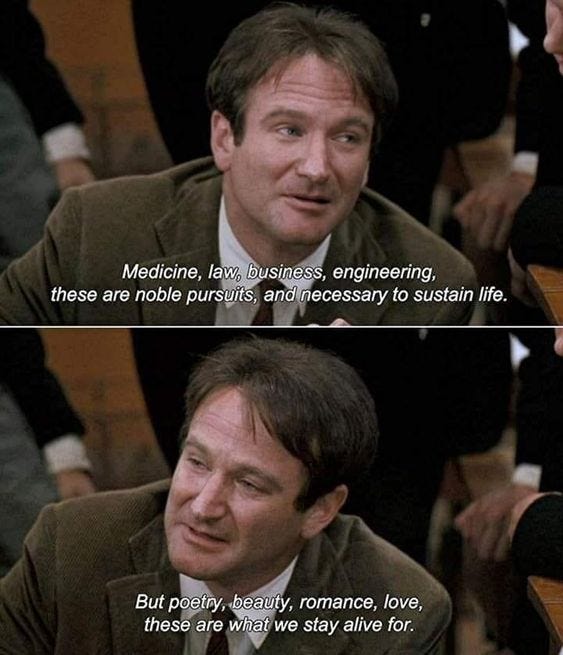Hello sweeties,
This piece of writing is the first in a series I will be doing on the “soul,” which, I believe, is the key to understanding our journey and the unique role we are meant to take on in this life.
According to James Hillman, we know our soul through “hints, intuitions, whispers, and the sudden urges and oddities that disturb your life and that we continue to call symptoms.” It is a celebration of all the unique parts of ourself and also demonstrates our purpose, separate from commerce, power and practicality. This still from “The Dead Poet’s Society” reminds me of the soul:
Of course, in the realm of the soul, these things intermingle. But the soul doesn’t just manifest as our purpose; it was also used to delineate our temperament and personality—the mundane manifestations of our divine connection.
I wanted to especially highlight and praise the work of Ali Olomi, whose patreon is a treasure trove of information on Medieval and Islamicate astrology and much of this essay is indebted to his work. Please check out his work if you haven’t already!
This essay is for anyone who wants to know themself more deeply and discover how astrology can help us do that.
May it bring wisdom, poetry, joy, to all those who read.
The Soul
To speak of the soul is to speak of the life of the unseen. In Timaeus, Plato tells that God created the soul before he created the “corporeal universe”, and that this the soul is “interfused everywhere from the centre to the circumference of heaven,” both infused and enveloping matter.
In other words, soul is everywhere. Plato also tells us it is timeless: the soul created “a divine beginning of never ceasing and rational life enduring throughout all time”. The soul, in other words, is all-pervasive, yet invisible: While the body of heaven itself is visible, “the soul is invisible,” though Plato is sure to mention that God “made the soul in origin and excellence prior to and older than the body, to be the ruler and mistress, of whom the body was to be the subject”. It is from the soul from which our life and its purpose originate.
Part of the reason the soul comes before the body is because it was seen as life-giving, often connected to the breath. Juan Eduard Cirliot in “A Dictionary of Symbols” connects breathing to holiness because it “enables man to absorb not only air but also the light of the sun” from which celestial influences can enter us. Our own pieces of the divine soul connect us to the world of spirit, as well as to the world around us, for what is breath but our continual intake and exhalation of what is outside of us?
In this way, the soul connects us downward, to earth and our sense, and upwards, towards the light of the divine. By being brought into the body, as Ali Olomi explains in a podcast episode, “History of Divination and Fortune-telling,” “the soul gained some sort of sensory perception, which then produces thoughts… the body then provides senses and through that senses, the soul is able to have thought known as contemplation”. By connection upwards, to the heavens, Olomi continues, “the soul gains knowledge and secret understanding,” which it could not have through mental perception alone.
Indeed, according to Lee Lehman in her presentation on the mind-memory interface, what “we now call ‘mind’ was subsumed in the Medieval concept of ‘soul’." Our ability to know was not solely credited with our one, rational mind but proved a connection to something unseen and more powerful than one’s thoughts. Plato even credits the soul with our ability to contemplate, stating it “partakes of reason and harmony, and being made by the best of intellectual and everlasting natures, is the best of things created”. No wonder that, alongside the Moon, Mercury is considered one of the soul indicators in our charts; our minds used to be where spirit and the earth met!
Keep reading with a 7-day free trial
Subscribe to Recent Bedroom to keep reading this post and get 7 days of free access to the full post archives.






